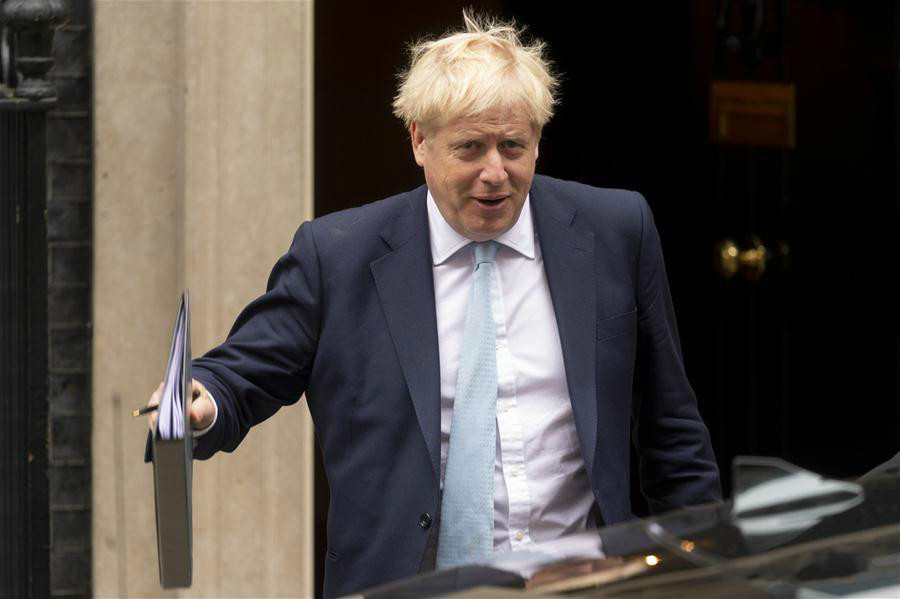
British Prime Minister Boris Johnson leaves 10 Downing Street in London, Britain, on Oct. 3, 2019. British Prime Minister Boris Johnson urged politicians in the House of Commons Thursday to back the new proposals he has submitted to Brussels to pave the way for Britain to leave the European Union on Oct. 31. (Photo by Ray Tang/Xinhua)
LONDON, Oct.3 -- Opposition MPs in the House of Commons and European Parliament politicians gave British Prime Minister Boris Johnson's new Brexit plan thumbs-down on Thursday.
There was also a downbeat reaction for the British government from Dublin and Scotland.
Donald Tusk, president of the European Council, said on his social media site that he had telephone calls Thursday with Dublin, and then with London. He added: "My message to Leo Varadkar (Irish Prime Minister) was: We stand fully behind Ireland, my message to Boris Johnson was 'We remain open, but still unconvinced.'"
Varadkar gave details at a press conference in Dublin of his concerns about Johnson's deal.
He said Johnson's plans for an alternative to the backstop fall short in a number of aspects.
He added he was concerned about Britain's Northern Ireland being in a different customs zone than Ireland.
Varadkar said: "Our objective is very clear -- we don't want to see any customs posts between north and south nor do we want to see any tariffs or restrictions on trade between north and south."
Johnson faced MPs in the House of Commons to urge them to support the deal which he says resolved the controversial issue over the fate of the border between Northern Ireland and Ireland.
And he made it clear in his speech that if the European Union (EU) rejects the proposals, Britain will leave the EU on October 31 with no deal.
The day's development also saw a war of words between Dublin and Belfast.
That came after Ireland's deputy prime minister and foreign minister Simon Coveney reacted to Johnson's proposals, saying: "If that is the final proposal there will be no deal, there are a number of fundamental problems with that proposal. There are elements of this proposal that simply will not be part of any deal."
Coveney said in the Irish Parliament in Dublin there will be no agreement unless Britain makes further changes to the alternative backstop plan.
The backstop is the insurance policy demanded by Brussels to ensure no hard frontier is created on the island of Ireland.
In response, Arlene Foster, leader of Northern Ireland's main party, the Democratic Unionist Party (DUP) hit out at Dublin's stance.
She said: "Mr Coveney's rejection of a reasonable offer is paving the road for a no-deal exit because unionism will not allow Northern Ireland to be trapped at the whim of Dublin or the EU. We will not buy that."
Political commentators in Britain say the new proposals have a better chance than former British prime minister Theresa May's Brexit deal of winning the backing of the House of Commons.
But a tougher task for Johnson is winning the approval of Brussels and each of the 27 EU members, including Ireland.
The European Parliament's Brexit Steering Group issued its response to the proposals Thursday after being briefed by Michel Barnier, the EU's chief Brexit negotiator.
In their statement, the steering group said it did not find the latest British proposals acceptable in their current form as representing a basis for an agreement that the European Parliament would give consent.
"The proposals do not address the real issues that need to be resolved," the statement added, citing the all-island economy, the full respect of the Good Friday Agreement, and the integrity of the European Single Market.
The statement concluded: "While we remain open to workable, legally operable and serious solutions, the UK's proposals fall short and represent a significant movement away from joint commitments and objectives."
Johnson also faces difficulties in Britain with the main opposition Labour and the Scottish National Party (SNP). Labour leader Jeremy Corbyn described Johnson's proposals as unworkable, and he said Labour MPs would vote against them.
Despite the avalanche of rejections from all directions, Johnson remained determined.
He said in the Commons: "This government's objective has always been to leave with a deal. And these constructive and reasonable proposals show our seriousness of purpose.
"They do not deliver everything that we would have wished. They do represent a compromise."
"If our European neighbors choose not to show a corresponding willingness to reach a deal, then we shall have to leave on 31 October without an agreement, and we are ready to do so," he added.
















